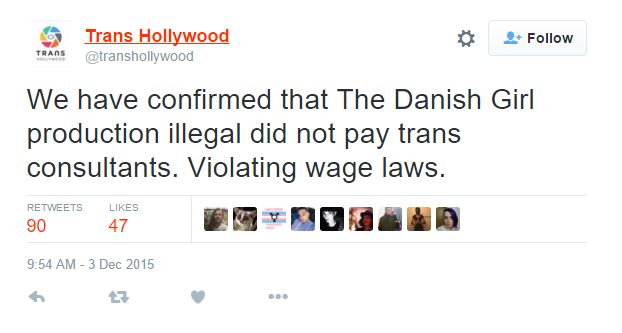By now, many have heard criticisms of Rocket Stack Rank’s reviews of stories containing non-binary and/or trans characters. Reviews that misgender characters in a story, that misgender authors of stories, that focus heavily on genitals or delegitimizing non-binary pronouns. On the site, RSR explains that its criticisms are limited to stories and publications, but that its negative reviews shouldn’t be considered criticism of an author. And yet we find it hard to understand how a criticism of a character’s identity, especially when shared by the author, should not be considered a criticism of the author, or any reader that would share that identity.
The reviewer, who is not trans and/or non-binary, makes judgments about the validity of pronouns and identities, and decides which author “makes good use of [transness]” and which authors do not. This is problematic and hurtful. This is a way of saying “you do not belong.” A way of saying “stories about you don’t belong.” When reviews specifically cite pronouns of characters as justifications for rating a story down, a line is crossed. A line where not only writers but readers may find their identity questioned, belittled, and willfully misunderstood. A line that RSR crosses often and with seeming impunity.
Things get even more uncomfortable when we look at the way that non-traditional narratives are treated by the site. Especially for styles that come from outside a Western/European/White American tradition, the complaint of “this is not really a story” rears its ugly head. “This is not a story” type of sentiment seems to be disproportionately applied to stories by authors of color and/or non-Western authors. RSR reviews of stories from authors of color and/or non-Western authors frequently use dismissive and outright offensive language, such as calling some of these stories “exotic” and similar. Here, like with stories by non-binary/trans authors, RSR signals to marginalized authors: “you do not belong.” To us, this dismissive approach shows a complete refusal to engage with texts on their terms – which, in effect, disproportionately negatively impacts writers coming from outside the traditional inroads into SFF.
RSR and its main reviewer, Greg Hullender, have gained a considerable influence in the field, with a Hugo nomination, a third-party link on the Hugo website, and now a place on the Locus jury. RSR has positioned itself as an authority on short fiction, an objective source of reviews with an emphasis on numbers and ratings to aid in the selection of stories for awards. The deeply ingrained biases of the reviews (pointed above), are especially problematic considering RSR’s growing influence. RSR and Greg Hullender’s approach once again seeks to reaffirm the institutional inequalities of short SFF by dismissing undesirable “outsiders.”
When confronted with his biases, Greg Hullender often refuses to acknowledge he has an issue, pointing out that he is a gay man who engaged in GLBT activism in the past, and thus cannot be transphobic.
Greg Hullender also uses his identity as a gay man and former activist to police and pass judgment on the kinds of sex characters can have in stories – and the judgments go beyond the stories reviewed, to what kind of sex people can have. Here again, Greg Hullender often insists on his views being generic and objective, judging acts outside of his preferences as disturbing, abusive, and deviant. These judgments often go hand in hand with other issues – such as an anti-trans and an anti-NB stance – in his reviews. Thus, reviewing JY Yang’s Tor.com novellas, Hullender equated sex with a nonbinary person with paedophilia.
We have repeatedly observed how RSR’s main reviewer, Greg Hullender, uses his identity as a gay man as a shield against legitimate criticisms. The assumption is that because the main reviewer is a gay man he has some sort of inability to be bigoted toward any other marginalized group or person. That this would excuse him calling stories with non-binary characters fads or arguing that singular they pronouns are somehow not correct unless they are tied to a specific genital state.
This Twitter thread by Bogi Takács contains a large number of screen-caps and commentary, including specific instances of the issues mentioned above: https://twitter.com/bogiperson/status/934609665966727168
We have been working to draw attention to this ongoing problem for almost as long as Rocket Stack Rank has operated – at first indirectly. But the amount of problematic reviews continues to grow just as RSR’s stature in the field continues to increase. The exclusionary reviews and their growing influence in the sphere of awards cast a long shadow in the field. It is worrying to see important institutions within SFF endorsing and promoting RSR over the objections and concerns of writers, readers, and other reviewers (including writers, readers and reviewers of color and trans writers, readers and reviewers).
We hope that our concern is acknowledged and that current promotion of problematic reviewing habits cease to be rewarded in SFF publishing.
Thank you for your time,
Brooke Bolander
Indrapramit Das
Ada Hoffmann
Keffy R.M. Kehrli
Rose Lemberg
Sunny Moraine
Suzanne Palmer
Charles Payseur
A. Merc Rustad
K.M. Szpara
Bogi Takács
JY Yang
Note: The above signers collaborated in drafting the letter, additional people who wish to cosign have commented below.
Edited to add: Statement by Locus: https://twitter.com/locusmag/status/936291052100579334




